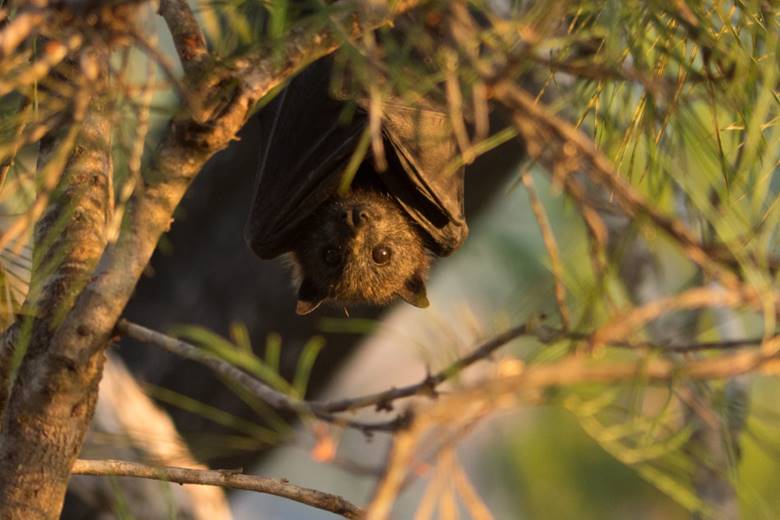Media Releases
Contact media@wires.org.au for enquiries or call 0416 272 153.
Read the latest updates on our emergency and bushfire projects here.
Flying-Foxes are in Trouble

Photo credits – Andrya Hart, Flying-fox at The Channon
Have you seen a flying-fox recently in the daytime in a tree? Or found one dead on the ground?
Large areas of the North Coast of NSW as well as South East Queensland
are experiencing what appears to be a severe flying-fox starvation and
dehydration event. It is thought that the unusually dry conditions have
affected flowering and fruiting of their usual feed trees. Moisture
content on foliage is currently very low, fruit and flowers also lack
the normal amount of moisture and this is where bats get their nutrition
and hydration.
There are many reports of bats being found alone in trees in the daytime not having the energy to return to roost in their colony. Several WIRES branches are receiving unprecented numbers of flying-fox calls for this time of the year. They, like all wildlife groups in the area, are stretched to the limit.
With a limited number of volunteer vaccinated bat rescuers, WIRES
is asking the public to be understanding in this situation and would
like to provide some advice should you see a flying-fox alone:
- Most importantly, please do not attempt to handle the flying-fox. There is no risk to you if you do not handle the bat.
- Observe the flying-fox and check if it is actually still alive. Many bats are hanging dead in trees - some are dead on the ground. If it is dead, simply scoop it up in a towel or newspaper and dispose of it.
- If it is alive, DO NOT disturb the flying-fox or attempt to shoo it away. This will just stress it further and make it weaker. It needs to rest and regain strength so it can return to the colony.
- Keep people and pets such as dogs and cats away so they don’t stress the already compromised animal.
- If the bat looks sick or injured, or is low down in a particularly public space, phone WIRES. They will help assess the situation and determine whether it needs to be brought into care.
- If the bat appears uninjured and is moving around wait until the following day and see if the animal flies off overnight.
- If the bat is still there the following day, phone WIRES for advice.
- If you do want to assist further you can try putting some fruit such as apple or pear in nearby trees, making sure not to go close to the bat. This may in some instances give it the extra nutrition and moisture it needs to survive.
- Of course if you find a live bat on a barbed wire fence or entangled in netting please call WIRES immediately and a rescuer will attend.
Flying-foxes are very intelligent creatures and play an important role in Australian environments. They are natural pollinators and seed dispersers and are crucial for the survival and regeneration of our native forests. Sadly, this starvation event appears to be yet another indication of the catastrophic affect of a changing climate on our ecosystems. Please do what you can to plant native trees and plants so that in the future our wildlife will have food available to them.
If you are keen to make a difference for wildlife, consider joining WIRES. For more information about how you can join read WIRES information about becoming a volunteer.
WIRES Northern Rivers covers the area of the Drake/Ewingar fires – easterly from Drake. Please phone (02) 6628 1898 for wildlife assistance. For Mid North Coast and other regions in NSW please call WIRES NSW Rescue Line on 1300 094 737.
WIRES relies heavily on the generosity of caring people for support. All donations $2 and over are tax-deductible. We need help to feed all the native animals in care, to assist, please donate now to WIRES Wildlife Food Fund.
Search
Newsletter
Stay in touch and get our regular rescue stories, WIRES updates and a free copy of our 15 Ways to Help Wildlife ebook
Recent Posts
- WIRES Northern Rivers & Clarence Valley welcome new Emergency Responder and Wildlife Ambulance
- WIRES Supports Tasmanian Wildlife and Wildlife Rehabilitators
- WIRES Research Grants Program 2023
- WIRES awards 75 Grants to support wildlife sector
- New Voice to fight for koala protection: Sydney Basin Koala Network
- Bravecto Spot-On for Dogs is combatting wombat mange
- Join the fight to save wombats from mange
- Radicool Australia and WIRES release new range of kids UV protection hats and swimsuits
- Spring has sprung: Native Animal ornaments are back at Woolworths
- Highlighting native animal research in Australia
